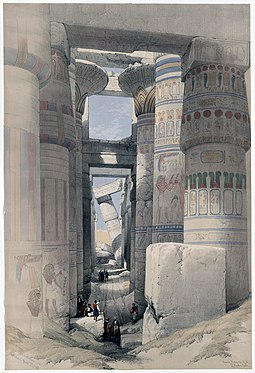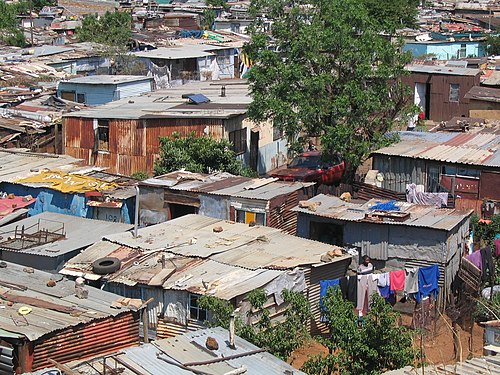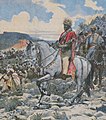Portal:Africa



Africa is the world's second largest and second-most populous continent after Asia. At about 30.3 million km2 (11.7 million square miles) including adjacent islands, it covers 20% of Earth's land area and 6% of its total surface area. With 1.4 billion people0 as of 2021, it accounts for about 18% of the world's human population. Africa's population is the youngest amongst all the continents; the median age in 2012 was 19.7, when the worldwide median age was 30.4. Despite a wide range of natural resources, Africa is the least wealthy continent per capita and second-least wealthy by total wealth, ahead of Oceania. Scholars have attributed this to different factors including geography, climate, corruption, colonialism, the Cold War, and neocolonialism. Despite this low concentration of wealth, recent economic expansion and the large and young population make Africa an important economic market in the broader global context. Africa has a large quantity of natural resources, including diamonds, sugar, salt, gold, iron, cobalt, uranium, copper, bauxite, silver, petroleum, natural gas and cocoa beans, as well as tropical fruit.
Africa straddles the equator and the prime meridian. It is the only continent to stretch from the northern temperate to the southern temperate zones. The majority of the continent and its countries are in the Northern Hemisphere, with a substantial portion and a number of countries in the Southern Hemisphere. Most of the continent lies in the tropics, except for a large part of Western Sahara, Algeria, Libya and Egypt, the northern tip of Mauritania, and the entire territories of Morocco, Ceuta, Melilla, and Tunisia which in turn are located above the tropic of Cancer, in the northern temperate zone. In the other extreme of the continent, southern Namibia, southern Botswana, great parts of South Africa, the entire territories of Lesotho and Eswatini and the southern tips of Mozambique and Madagascar are located below the tropic of Capricorn, in the southern temperate zone.
Africa is highly biodiverse; it is the continent with the largest number of megafauna species, as it was least affected by the extinction of the Pleistocene megafauna. However, Africa also is heavily affected by a wide range of environmental issues, including desertification, deforestation, water scarcity and pollution. These entrenched environmental concerns are expected to worsen as climate change impacts Africa. The UN Intergovernmental Panel on Climate Change has identified Africa as the continent most vulnerable to climate change.
The history of Africa is long, complex, and varied, and has often been under-appreciated by the global historical community. Africa, particularly Eastern Africa, is widely accepted as the place of origin of humans and the Hominidae clade (great apes). The earliest hominids and their ancestors have been dated to around 7 million years ago, including Sahelanthropus tchadensis, Australopithecus africanus, A. afarensis, Homo erectus, H. habilis and H. ergaster—the earliest Homo sapiens (modern human) remains, found in Ethiopia, South Africa, and Morocco, date to circa 233,000, 259,000, and 300,000 years ago, respectively, and Homo sapiens is believed to have originated in Africa around 350,000–260,000 years ago. Africa is also considered by anthropologists to be the most genetically diverse continent as a result of being the longest inhabited. (Full article...)
Selected article –
The Sahara (/səˈhɑːrə/, /səˈhærə/) is a desert spanning across North Africa. With an area of 9,200,000 square kilometres (3,600,000 sq mi), it is the largest hot desert in the world and the third-largest desert overall, smaller only than the deserts of Antarctica and the northern Arctic.
The name "Sahara" is derived from Arabic: صَحَارَى, romanized: ṣaḥārā /sˤaħaːraː/, a broken plural form of ṣaḥrā' (صَحْرَاء /sˤaħraːʔ/), meaning "desert". (Full article...)Featured pictures –
Did you know (auto-generated) -

- ... that the lenient sentencing of two Europeans convicted in 1918 after the death of a black man in the East Africa Protectorate led to inquiries from the British Colonial Office?
- ... that Jérôme Chappellaz wants to collect ice cores from Africa's Mount Kilimanjaro to be preserved in Antarctica?
- ... that Kenyan coffee farmer "Pinkie" Jackson amassed Africa's largest collection of native butterflies?
- ... that one way to tell the African dusky flycatcher apart from the ashy flycatcher is that the former is "cuter"?
- ... that the Enterprise, a black newspaper in Omaha, supported a separate African American department at the 1898 Trans-Mississippi Exposition?
- ... that after the 1999 Tempe military base shooting, the Pan African Congress demanded a military funeral for the perpetrator?
Categories
Selected biography –
Didier Yves Drogba Tébily (French pronunciation: [didje iv dʁɔɡba tebili]; born 11 March 1978) is an Ivorian former professional footballer who played as a striker. He is the all-time top scorer and former captain of the Ivory Coast national team. He is best known for his career at Chelsea, for whom he has scored more goals than any other foreign player and is currently the club's fourth highest goal scorer of all time. Drogba was named Chelsea's greatest ever player in a poll of 20,000 fans conducted by Chelsea FC Magazine in 2012, and he was also named in the Chelsea team of the 2010–2020 decade by Chelsea's fans in 2020. Regarded as one of the greatest African players of all time, he was noted for his physical strength, speed, ability in the air, powerful and accurate strikes, and ball retention. Drogba was named African Footballer of the Year twice, winning the award in 2006 and 2009.
After playing in youth teams, Drogba made his professional debut aged 18 for Ligue 2 club Le Mans, and signed his first professional contract aged 21. After finishing the 2002–03 season with 17 goals in 34 appearances for Ligue 1 side Guingamp, he moved to Olympique de Marseille, where he finished as the third highest scorer in the 2003–04 season with 19 goals and helped the club reach the 2004 UEFA Cup Final. (Full article...)Selected country –
 |
 |
||

| |||
Ghana, officially the Republic of Ghana, is a country in West Africa. It borders Côte d'Ivoire to the west, Burkina Faso to the north, Togo to the east, and the Gulf of Guinea to the south. It was inhabited in pre-colonial times by a number of ancient kingdoms, including the Ga Adangbes on the eastern coast, the inland Empire of Ashanti and various Fante states. Trade with European states flourished after contact with the Portuguese in the 15th century, and the British established a crown colony, Gold Coast, in 1874. Upon achieving independence from the United Kingdom in 1957, the name Ghana was chosen for the new nation to reflect the ancient Empire of Ghana that once extended throughout much of west of Africa.
Ghana is a republic and member of the Commonwealth of Nations. Its head of state is President John Agyekum Kufuor, the ninth leader of the country since independence. The government sits at Osu Castle. The Parliament of Ghana is unicameral and dominated by two main parties, the New Patriotic Party and National Democratic Congress. (Read more...)
Selected city –

Fez or Fes (/fɛz/; Arabic: فاس, romanized: fās) is a city in northern inland Morocco and the capital of the Fès-Meknès administrative region. It is the second largest city in Morocco, with a population of 1.11 million, according to the 2014 census. Located to the northwest of the Atlas Mountains, it is surrounded by hills and the old city is centered around the Fez River (Oued Fes) flowing from west to east. Fez has been called the "Mecca of the West" and the "Athens of Africa". It is also considered the spiritual and cultural capital of Morocco.
Founded under Idrisid rule during the 8th–9th centuries CE, Fez initially consisted of two autonomous and competing settlements. Successive waves of mainly Arab immigrants from Ifriqiya (Tunisia) and al-Andalus (Spain/Portugal) in the early 9th century gave the nascent city its Arab character. After the downfall of the Idrisid dynasty, other empires came and went until the 11th century when the Almoravid Sultan Yusuf ibn Tashfin united the two settlements into what is today's Fes el-Bali (lit. 'Old Fes') quarter, a.k.a. Medina of Fez. Under Almoravid rule, the city gained a reputation for religious scholarship and mercantile activity. (Full article...)In the news
- 12 February 2024 –
- Two boats collide on the Congo River near Kinshasa, Democratic Republic of the Congo; with the death toll remains unclear. (AP)
- 11 February 2024 – 2023 Africa Cup of Nations
- In association football, hosts Ivory Coast win their third Africa Cup of Nations by defeating Nigeria 2–1 in the final. Sébastien Haller scores the winning goal in the 81st minute. (The Guardian)
- 10 February 2024 – Somali civil war
- Four Emirati soldiers and a Bahraini military officer are killed, while ten other people are injured, when a soldier opens fire at a military base in Mogadishu, Somalia, before being killed in the ensuing shootout. Al-Shabaab claims responsibility. (AP)
- 10 February 2024 –
- A Eurocopter EC130 helicopter crashes near Nipton, California, United States, killing all the six people on board, including Nigerian banker Herbert Wigwe. (CBS News)
- 10 February 2024 – 2023–2024 Senegalese protests
- Violent protests occur in Senegal following an announcement by President Macky Sall that presidential elections have been delayed from February 25 to December 15. (Sky News)
- 9 February 2024 –
- At least 18 people are killed during a collision between a bus and a truck on a road in Kinshasa, Democratic Republic of the Congo. (AP)
Updated: 16:33, 14 February 2024
General images -
Africa topics
More did you know –
- ...that Iyabo Obasanjo-Bello, a Nigerian Senator from the People's Democratic Party, is the daughter of former President Olusegun Obasanjo?
- ...that the 2007 South Africa miners' strike, which impacted over 240,000 workers, was the first ever industry-wide miners' strike in the history of South Africa?
- ...that Seleh Leha, a town in Tigray Region in northern Ethiopia, was the site of a leprosarium built during the Italian occupation of East Africa and abandoned in 1941?
- ...that Sarir field, an oil field in Cyrenaica operated by the Arabian Gulf Oil Company (AGOCO), is considered to be the largest in Libya, with estimated oil reserves of 12 Gbbl (1.9×109 m3)?
Related portals
Major Religions in Africa
North Africa
West Africa
Central Africa
East Africa
Southern Africa
Associated Wikimedia
The following Wikimedia Foundation sister projects provide more on this subject:
-
Commons
Free media repository -
Wikibooks
Free textbooks and manuals -
Wikidata
Free knowledge base -
Wikinews
Free-content news -
Wikiquote
Collection of quotations -
Wikisource
Free-content library -
Wikispecies
Directory of species -
Wikiversity
Free learning tools -
Wikivoyage
Free travel guide -
Wiktionary
Dictionary and thesaurus




























































































